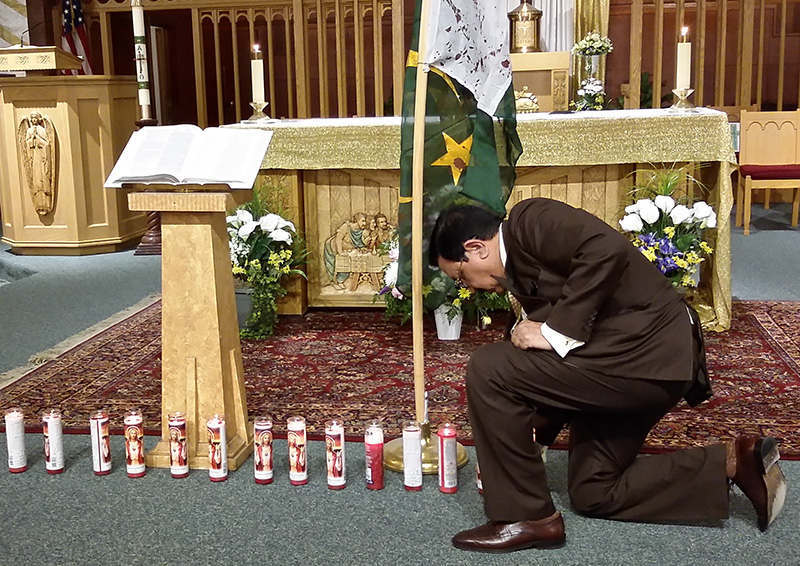Following a recent series of deadly attacks on Christians in Pakistan, members of the Philadelphia Archdiocese’s Pakistani Catholic community gathered for a prayer vigil April 21 at St. William Parish in Northeast Philadelphia.
More than 40 attendees prayed in both English and Urdu, led by Father Tariq Isaac, the chaplain of the archdiocesan Pakistani Catholic community.
Father Isaac said he organized the vigil “to express our solidarity and concern for our community in Pakistan.”
[hotblock]
On April 15, two young men were killed as gunmen opened fire on a group of Christians standing near a church in Quetta, located in southwestern Pakistan. On April 2, the day after Easter, a Christian family of five was shot while riding in a rickshaw; four adults were killed, and a young girl was injured. ISIS claimed responsibility for the attack.
The National Commission for Justice and Peace, an outreach of the Pakistan Catholic Bishops’ Conference, strongly condemned the acts of violence. Archbishop Joseph Arshad, who chairs the commission, mourned the “loss of precious lives” and offered prayers “for the souls of the deceased, the injured and their families.”
The commission’s executive director, Cecil Shane Chaudhry, decried the emergence of a “dangerous trend” that showed “the inability of the national action plan to counter extremism and indifference.”
Shamoon Bashir, a member of Resurrection of Our Lord Parish in Philadelphia, lost his uncle and three other family members in the April 2 shootings.
“My uncle sacrificed his life during the gunfire in order to save the child,” Bashir said. “He died with his arms sheltering her.”
During the vigil at St. William, Bashir sang two hymns in Urdu in honor of his slain relatives, including a song his uncle had taught him that began with the phrase, “the word of God draws you to him.”
Victor Gill, a freelance journalist and longtime advocate for Christians persecuted in his native Pakistan, noted there were several identifiable stages to the escalation of religious intolerance.
“It starts in the heart,” he said, addressing the vigil attendees. “It begins as prejudice, then becomes discrimination. From there it develops into persecution, and eventually genocide.”
Gill added that the ongoing violence in Pakistan could not ultimately be resolved by mere human means.
“It takes a God,” he said.
[hotblock2]
During the evening’s reflection, Justin Sharaf of St. William Parish noted that religious tensions have long plagued Pakistan, a predominantly Sunni Muslim nation formed in 1947 when British India was partitioned.
Christians, Hindus and minority sect Muslims (such as Shia and Ahmadi) in total represent just 4 percent of the nation’s population, which is currently estimated at approximately 200 million.
Pakistan’s blasphemy laws, under which any insult to Islam may be punishable by death, have been increasingly criticized for unfairly targeting believers from minority faiths.
Siser Rose Patrice Kuhn, I.H.M., observed that the April 21 prayer vigil “was part of Pope Francis’ call to share the journey” with migrants and refugees.
“I really appreciated that our Pakistani brothers and sisters shared these painful experiences with us,” said Sister Rose, who oversees the Hispanic ministry at St. William. “In this way, we can journey more closely with them as part of the body of Christ.”
At the end of the service, attendees silently placed lighted candles in front of a flag of Pakistan that had been symbolically streaked with red to represent the blood of martyred Christians.
***
A “Quetta Martyrs Fund” has been established to assist the families of Christians killed in Pakistan. For more information, contact Shamoon Bashir at 267-439-2368 or Haroon Bashir at 215-954-7836.
PREVIOUS: At Catholic after-school program, kids’ minds, hearts flourish
NEXT: Our Lady Help of Christians Church set to close as worship site




Share this story